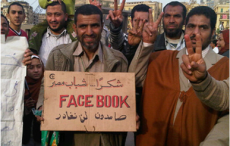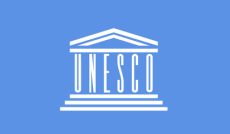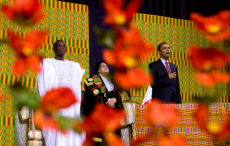The CPD Blog is intended to stimulate dialog among scholars and practitioners from around the world in the public diplomacy sphere. The opinions represented here are the authors' own and do not necessarily reflect CPD's views. For blogger guidelines, click here.

The Cyrus Cylinder, a small clay object dated from the sixth century B.C.E. and covered in Babylonian cuneiform script of an imperial decree by King Cyrus of Persia, is considered by many to be a powerful symbol of cultural and religious tolerance. Its international touring exhibition, spearheaded by the British Museum, has drawn broad global attention and is, by most measures, a resounding success.

A new book by Naomi Sakr, Transformations in Egyptian Journalism (I.B. Tauris, 2013), should be required reading for American public diplomacy specialists who want to engage Egyptians through the media.

A few months ago, the Pew Research Center observed that Americans’ “isolationist sentiment” hit an all time high. According to Pew, Americans want to pay attention to problems at home, rather than focusing on problems overseas.

The increased tempo of Beijing’s public diplomacy activities in recent years, from Confucius Institutes to the 2010 Shanghai World Expo, have received poor to mediocre reviews internationally. Expensive projects have been received positively by the Chinese public, but have done little to reverse China’s continued international image problems. Although a narrative of crisis pervades international scholarship on Chinese public diplomacy, there appears little evidence to suggest that Beijing is concerned.

How does what we know about information and communication technology (ICTs) and persuasion help practitioners makes sense of how to integrate technology into the mission of public diplomacy? We know that ICTs can be:
A) Persuasive by its ability to facilitate or enable other attempts at persuasion.
B) Persuasive as a transmission vehicle (the medium endows some form of credibility or legitimacy).
C) Persuasive as a kind of context for communication - an intermediary - that enables the influence potential of social ties.

If you’re of Pakistani origin, as I am, and if you long to see that embattled country right itself, the saga of Malala Yousafzai can drive you to tears. Not just tears of joy for the way she was a favorite for this year’s Nobel Peace Prize. Not just tears for how she captured the imagination of Westerners who want to believe the best about Pakistan’s hopes and prospects.

On Sunday, September 22, 2013, al-Shabab, a Somali-based al Qaeda cell unleashed gunfire on a Kenyan shopping mall, murdering 72 people and injuring over 200 others. The deadliest terrorist attack in Kenya since the 1998 bombing of the U.S. Embassy in Nairobi, the Kenyan mall shooting temporarily brought Africa to the forefront of U.S. news organizations like CNN, MSNBC, and Fox, who typically ignore the continent.

Should public diplomacy policy-makers turn to digital diplomacy tools for the future of practice? I ask this question to provoke some reflection among public diplomacy watchers beyond the quick criticism of tweeting ambassadors and social media campaigns. There seems to be some debate over whether or not digital media practices represent the future of US public diplomacy.
Pages
Visit CPD's Online Library
Explore CPD's vast online database featuring the latest books, articles, speeches and information on international organizations dedicated to public diplomacy.
POPULAR ARTICLES
-
January 20
-
December 17
-
January 2
-
December 15
-
December 17
Featured Blogger
Join the Conversation
Interested in contributing to the CPD Blog? We welcome your posts. Read our guidelines and find out how you can submit blogs and photo essays >.








